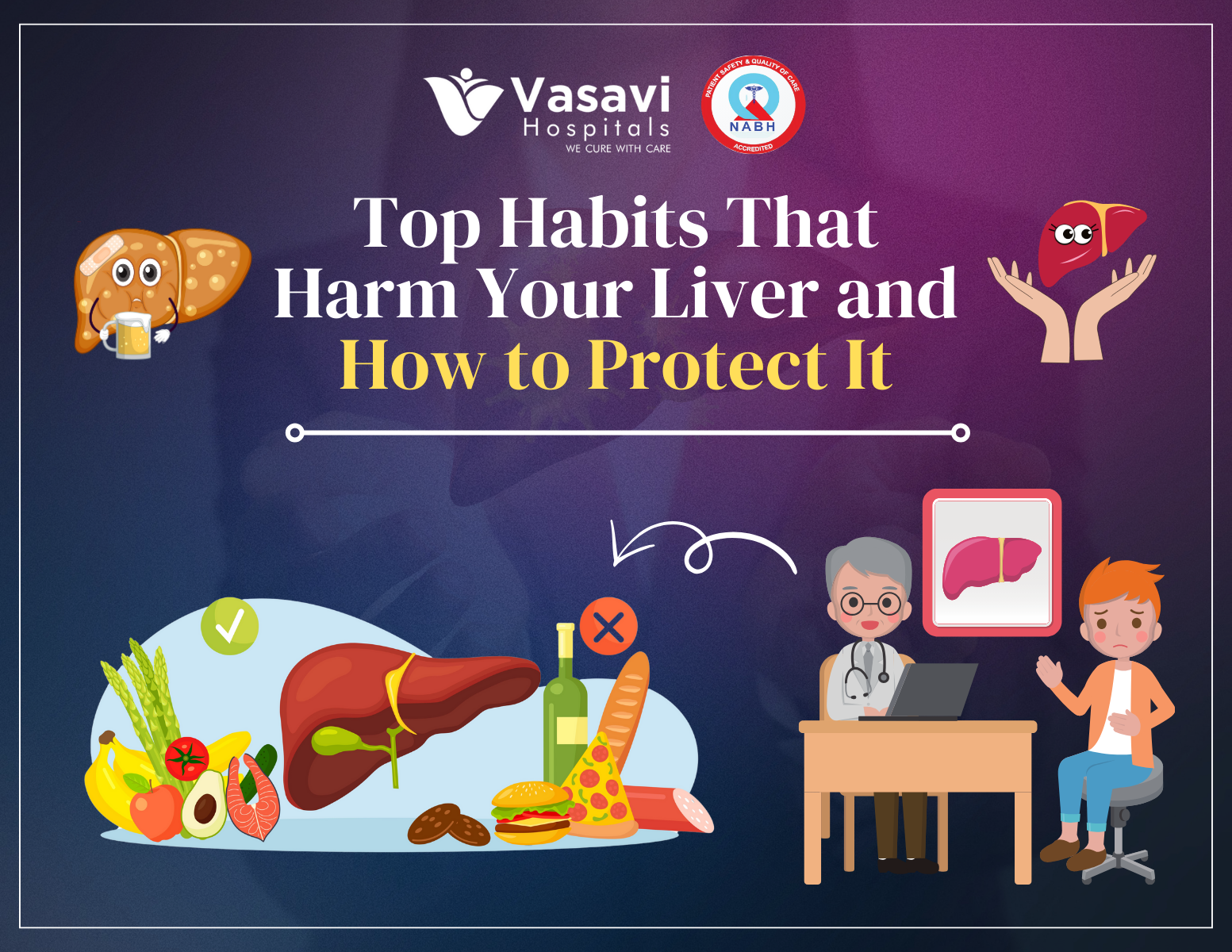Your liver is a silent workhorse — tirelessly filtering toxins, aiding digestion, and regulating essential metabolic functions. Yet, despite its critical role, liver health is often overlooked until something goes wrong. At Vasavi Hospitals, we believe in empowering individuals with the right knowledge to prevent health issues before they arise. In this article, we’ll walk you through the top everyday habits that can harm your liver and how you can adopt healthier choices to protect it.
Why Liver Health Matters
The liver is the body’s largest internal organ and performs over 500 functions — from detoxifying harmful substances to storing vitamins and minerals. When it’s compromised, it can affect every part of your body. Unfortunately, liver diseases often develop silently, showing symptoms only in later stages. Understanding and eliminating harmful habits is your first step toward prevention.
1. Excessive Alcohol Consumption
One of the leading causes of liver damage is chronic alcohol use. When you consume too much alcohol, your liver works overtime to process it, leading to inflammation, fat accumulation, and eventually conditions like alcoholic hepatitis, fibrosis, or cirrhosis.
What you can do: Limit alcohol intake to moderate levels. For men, this means up to 2 drinks per day; for women, up to 1 drink.
2. Poor Diet and Obesity
Diets high in sugar, unhealthy fats, and processed foods contribute to non-alcoholic fatty liver disease (NAFLD). Excessive calorie consumption leads to fat buildup in the liver, which can cause inflammation and scarring over time.
What you can do: Opt for a balanced diet rich in fruits, vegetables, whole grains, and lean proteins. Exercise regularly to maintain a healthy weight.
3. Overuse of Medications and Supplements
Self-medicating with over-the-counter painkillers, herbal supplements, or performance-enhancing drugs can strain your liver. Acetaminophen (paracetamol), when taken in high doses, is especially known for causing acute liver failure.
What you can do: Always follow dosage instructions and consult a physician before combining medications or taking supplements long-term.
4. Smoking and Substance Abuse
Tobacco contains harmful toxins that can accelerate liver fibrosis, especially in people with other liver conditions. Illicit drugs, such as heroin or cocaine, can also lead to severe liver damage.
What you can do: Quitting smoking and avoiding recreational drugs not only protect your liver but also benefit your overall health significantly.
5. Sedentary Lifestyle
Lack of physical activity contributes to obesity and insulin resistance — both risk factors for fatty liver disease. A sedentary lifestyle also slows metabolism, making it harder for your body to process fats and sugars effectively.
What you can do: Aim for at least 30 minutes of moderate exercise most days of the week. This can include brisk walking, cycling, or even yoga.
6. Unprotected Sex and Needle Sharing
Practices like unprotected sex or sharing needles increase your risk of contracting hepatitis B and C — viral infections that can cause long-term liver damage and even liver cancer.
What you can do: Practice safe sex and avoid sharing needles. Get vaccinated for hepatitis B if you haven’t already.
7. Ignoring Symptoms or Skipping Health Checkups
Symptoms like fatigue, jaundice, abdominal pain, and swelling might be signs of liver dysfunction. Unfortunately, many people ignore these signs until it’s too late.
What you can do: Regular health screenings and liver function tests can help detect issues early. If you’re experiencing any unusual symptoms, consult the experts at a trusted medical facility.
We recommend scheduling a check-up at the best hospital in Bangalore for personalized care and expert guidance.
How to Protect Your Liver — Proactive Steps
– Get Vaccinated: Protect yourself against hepatitis A and B through timely vaccination.
– Maintain a Healthy Weight: Obesity is closely linked to liver disease — stay active and eat mindfully.
– Limit Processed Foods: Reduce intake of sugary drinks, fried foods, and processed snacks.
– Stay Hydrated: Drinking enough water helps your liver flush out toxins effectively.
– Avoid Exposure to Toxins: Use protective gear if you’re working around chemicals or industrial substances.
– Get Regular Checkups: Visiting a hospital regularly helps monitor your liver’s health and detect any early signs of trouble.If you’re unsure about your liver health or need expert consultation, consider visiting one of the Top hospitals in Bangalore, known for its multidisciplinary approach and modern diagnostic tools.
